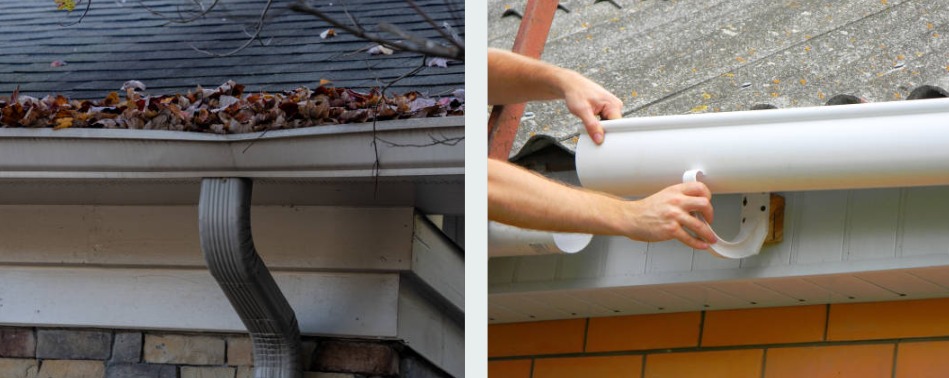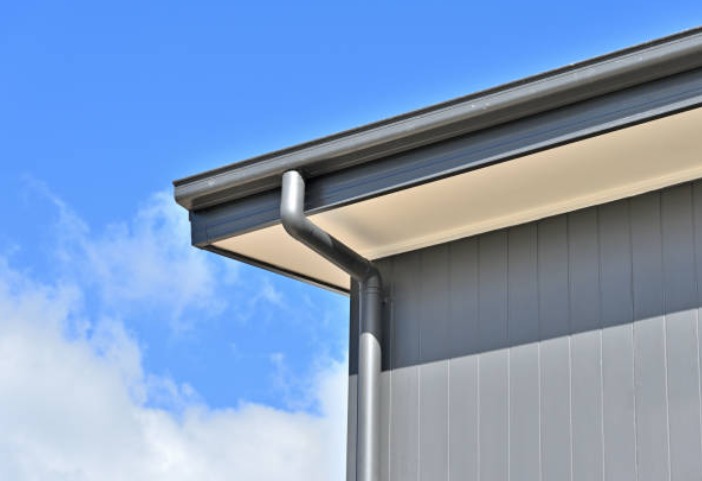In the grand scheme of home maintenance, we often ask ourselves “Are gutters necessary?” Yes, but the answer to this question can have significant repercussions on your house’s longevity, aesthetic appeal, and even its financial value.
Gutters are a crucial component of a home’s drainage system, connecting to the eaves of a house. Their role is to collect and channel rainwater away from your roof and house, shielding your property from water damage.
Gutters come in various materials, such as aluminum, vinyl, steel, and copper, each with its unique advantages and disadvantages.
The Functionality of Gutters
Gutters are installed under the edge of your roof to catch rainwater as it streams down your roof’s surface. The gutters then direct water to the edge of your roof and into vertical sectionals called downspouts.
Often, downspouts dispense the water into drainage systems or extensions that relocate the water away from your home’s foundation. You can also design an eco-friendly gutter system that channels the water into tanks for gardening during dry seasons.
Scenarios Where You Might Not Need Gutter
While gutters are generally highly recommended, there are some circumstances in which they may not be necessary. For instance, if your house is surrounded by concrete structures like sidewalks, driveways, or patios, it already has protection from cumulative rainwater.
Also, if you live in a drier climate that receives little rain, you’re less likely to need gutters.
The Importance of Gutters

The question “why are gutters important” is often answered with the response that gutters protect your home from water damage. Rainwater can seep into your home without gutters. It can lead to basement flooding, mold development, mildew, and damage to your home’s siding.
Moreover, they can prevent soil erosion, protecting your landscaping.
Reasons Why Your House Might Lack a Gutter
Your house might not have a gutter due to a variety of reasons. It could be that your home’s roof has a very steep slope and long overhang, which might already be working to sufficiently direct rainwater away from your house.
It could also be that you live in an arid environment where there isn’t much rain to protect your home against. Lastly, your house might be very old, built at a time when gutters weren’t commonly installed on residential homes.
Signs That Your House Needs a Gutter
If you’re still unsure about whether your house needs gutters or not, there are certain signs to look out for. These include frequent basement flooding, rotted or moldy siding, and troughs in your landscaping or next to your foundation.
These issues might indicate that your house needs gutters to prevent further damage.
Advantages of Having Gutters
Gutters offer several valuable benefits that make them a worthwhile investment. They help protect your home’s foundation, keep your siding clean and well-maintained, and prevent damage to your landscaping. Additionally, they reduce the risk of basement flooding and can even contribute to lower energy bills. Professional gutter installation and repair ensures your home stays protected from water damage.
Alternatives to Gutters on Houses
You may consider alternatives to traditional gutters in some situations. For instance, if your roof has a significant overhang, extending the roof may be more beneficial than adding gutters. There are gutter-less options for redirecting rain off a roof, which you can look up from local roofers.

Here are some Gutter alternatives for your house;
- Drip path
- Above-ground rain chain
- Drip edge
- Box gutter
- Rain dispersal system
Professional Help for Gutter Installation
The experts can help If you decide that your home needs a gutter. Professional gutter installation and roofing companies offer various services, including gutter installation, gutter maintenance, and advice on gutter quality. These service can make sure that your home’s drainage system functions smoothly. By considering Gutter installation by professionals you can prevent water damage to your home’s foundation and exterior walls. After installation, make sure to conduct regular maintenance to ensure that your gutters can remain clear of debris, which can be important for efficient drainage.
Gutter Maintenance Tips
It’s essential to maintain your gutter regularly. Regular maintenance should include inspecting the system for any signs of damage and leaks.
You should also clean the gutter to remove any debris, tighten the fasteners that keep your gutter in place, and replace or repair any damaged or missing parts.
Gutter Quality Considerations
Choose a high-quality system when selecting a gutter. Lower-quality gutter are more likely to fail when exposed to harsh weather conditions. Investing in a higher-quality system is necessary if you want your gutter to last.
